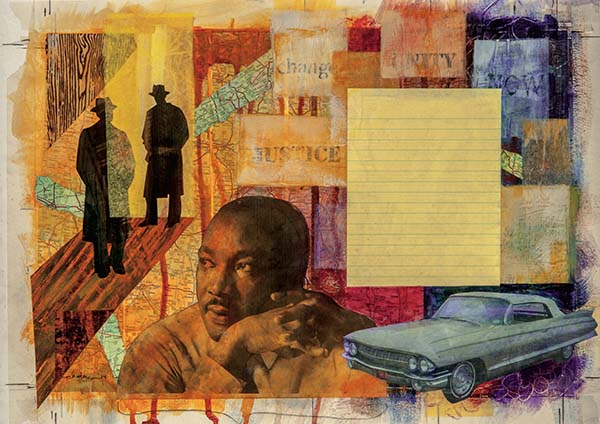 |
 |
| current issue |  |
past issues |  |
send a letter/news |  |
address update |  |
advertise |  |
about us |  |
alumni home |
Features
|
The Road I've Traveled: Lessons in Civil Rights
When my spring break teachers included a trucker and Dr. Martin Luther King. By the Rev. Richard Fernandez '60 with Jane Harrigan Also read: An interview with Dick Fernandez '60 What road have you traveled? Let us know!
Thump, thump, thump. The sound wove harmlessly through my dreams until a loud voice roused me: "Mr. Fernandez, open this door!" I sat up as my brain kept fumbling. Where was I? The answer came in pieces. YMCA. Montgomery, Alabama. Spring 1959. Junior year at UNH. Still, the summons made no sense. I knew no one in Montgomery, so who could be knocking? At the door, two men in suits barked names I quickly forgot while flashing badges I'd always remember. We're from the FBI, they said, and we have questions. Who are you? Where do you come from? Why are you in Montgomery? The more questions they asked, the more nervous I grew. Though I'd never been arrested, I had no doubt this was an interrogation. Finally one agent asked the big one: "Are you a member of the Communist Party, do you work for the NAACP, or do you write for The New York Times?" I'd soon learn that these three groups were inextricably linked in the minds of many Southerners who opposed integration. That night, however, all I could say was no. Finally, the agents turned to leave. "I wouldn't stay in Montgomery very long," one of them warned. My heart raced as I crawled back into bed. I was 24 years old, an Army veteran working on a research paper for a course at UNH. I'd attended a few small civil rights rallies in New Hampshire and a Yale conference at which liberal lawyer Allard Lowenstein described the 1950s South as a police state. Really? In America? I was skeptical. For my government course, I'd decided to explore the aftermath of the 1956 Montgomery bus boycott. But weeks of research had convinced me that working from Durham, I'd never fully understand. So with that blend of optimism and naivete reserved for the young, I used letters and phone calls to arrange interviews with a dozen key civil rights figures. Then I started hitchhiking to Alabama and Atlanta for spring break. Even before the FBI banged on my door, the trip had become a series of wake-up calls. Like a study-abroad program in my own country, it upended my assumptions and pushed me toward new ways of thinking. My teachers for this on-the-road education ranged from passing drivers to the Rev. Martin Luther King Jr. First came the well-dressed gentleman in the gray Cadillac who picked me up outside Washington, D.C. He had a phone in his car—in 1959! After chatting pleasantly, he suddenly began throwing around the N-word, talking about how "they" wanted to "use our libraries, swim in our pools, and get in bed with our women." |
blog comments powered by Disqus


